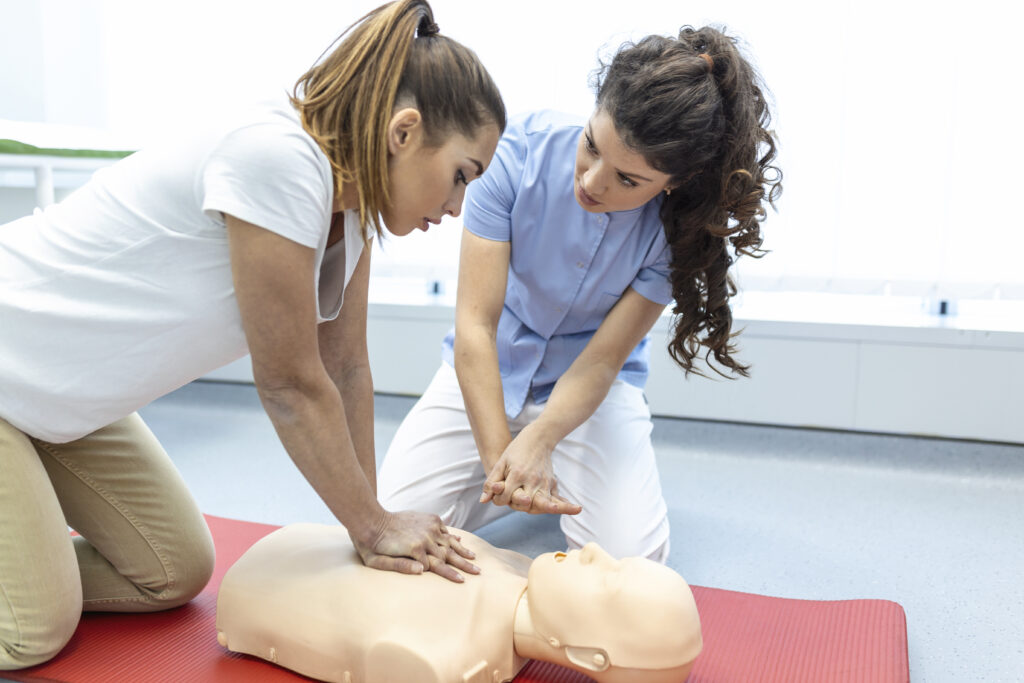ARC: Basic Life Support
The 2021 Basic Life Support (BLS) course trains healthcare and public safety professionals to effectively handle cardiac and breathing emergencies in adults, children, and infants. Offered in a blended format, the course requires completion of an online module before attending a hands-on skills session. A 2-year digital certificate is awarded upon successful completion. The American Red Cross is an accredited provider of continuing education for medical professionals.
Certifications Issued FAST
ARC: Basic Life Support
The 2021 Basic Life Support (BLS) course equips healthcare professionals and public safety personnel with essential skills to respond to breathing and cardiac emergencies in adults, children, and infants. Delivered in a blended learning format, participants must complete the online portion—accessible via mobile, desktop, or tablet—before attending the in-person, instructor-led skills session. Upon successful completion, participants receive a 2-year digital BLS certificate with 24/7 access to their credentials and training records.
The American Red Cross is accredited by the Accreditation Council for Continuing Medical Education (ACCME), the Accreditation Council for Pharmacy Education (ACPE), and the American Nurses Credentialing Center (ANCC) to provide continuing education for healthcare teams. Additionally, it is recognized by the Commission on Accreditation for Prehospital Continuing Education (CAPCE) as a provider of continuing education.


Class Settings
Classroom / Skills Check
- Local in-person training
- Learn from experienced instructors
- Convenient locations and times for instructor-led skills check
- Satisfies OSHA workplace safety certification requirements
Certification
Red Cross courses provide Digital Certification, giving you 24/7 access to your training history and course certificates online. These digital certificates can be viewed, printed, or shared anytime through your Red Cross Account. Each certificate includes a unique ID and QR code for easy verification by employers—meeting job requirements without the need to carry a printed copy.
CEUs
Continuing education credit units (CEUs) are avaiable for the following courses after successful completion:
- BLS
- First Aid
- CPR/AED
- Bloodborne Pathogens
Frequently Asked Questions
Can I get my CPR and First Aid certification online?
Not exactly. Fully online classes are usually not accepted by employers, as OSHA and state regulations require hands-on training. However, you can choose a blended-learning option, which combines online learning with an in-person skills session. To earn your CPR and First Aid certification, you’ll need to complete the online portion and then demonstrate your skills in person. Explore our blended-learning classes here.
Do you offer renewal CPR classes?
All of our CPR classes follow the same format whether you’re a first-time participant or renewing your certification. At Amara, we offer a variety of CPR courses for all skill levels and adapt the training to suit the needs of each group.
How long is a CPR certification valid for?
Students receive a CPR certification valid for two years upon successful completion of the class. The certification expires at the end of the month two years from the issue date.
How often do I have to renew my CPR and/or First Aid certification?
Plan to renew your certification every two years, as it’s valid until the end of the month it was issued. Some employers may require more current training, so you can choose to renew earlier if needed.
How will I receive my certification card?
After successfully completing the class, your certification will be emailed to you within one business day. You’ll then have the option to save or print your card.
What is an AED?
An AED, or automated external defibrillator, is a device used during cardiac arrest to detect and deliver a shock to correct an abnormal heart rhythm called Ventricular Fibrillation (V-Fib).
What's the difference between AHA and Red Cross classes?
Amara provides CPR classes authorized by both the American Heart Association (AHA) and the American Red Cross (ARC), covering the same national standards. However, some employers—especially in healthcare—may prefer one over the other, so it’s best to confirm with your employer before enrolling.
